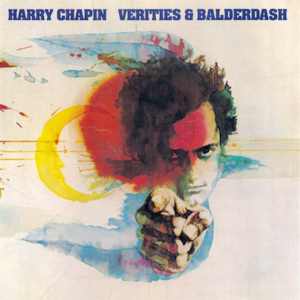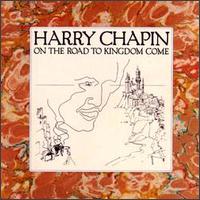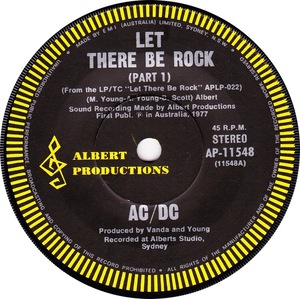
Harry Forster Chapin was an American singer-songwriter, philanthropist, and hunger activist best known for his folk rock and pop rock songs. He achieved worldwide success in the 1970s. Chapin, a Grammy Award-winning artist and Grammy Hall of Fame inductee, has sold over 16 million records worldwide.

"Crazy Little Thing Called Love" is a song by the British rock band Queen. Written by Freddie Mercury in 1979, the track is included on their 1980 album The Game, and also appears on the band's compilation album Greatest Hits in 1981. The song peaked at number two in the UK Singles Chart in 1979 and became the group's first number-one single on the Billboard Hot 100 in the US in 1980, remaining there for four consecutive weeks. It topped the Australian ARIA Charts for seven weeks. It was the band's final single release of the 1970s.

"Dog Eat Dog" is a song by Australian hard rock band AC/DC. It is the second track of their album Let There Be Rock, released in 1977, and was written by Angus Young, Malcolm Young, and Bon Scott.

Hidden Things is an album by Australian folk rock group Paul Kelly & the Messengers released in March 1992 on Mushroom Records, which reached No. 29 on the ARIA Albums Chart. It also reached the Top 40 on the New Zealand Albums Chart. It is a collection of tracks recorded by Kelly and both his backing bands, the Coloured Girls and the Messengers, from 1986 to 1991, but were not issued on previous studio albums. The album spawned a single, "When I First Met Your Ma", which was released in March. Messenger band members provide lead vocals on "Hard Times" from its writer Steve Connolly, and "Rock 'n' Soul" from its writer Jon Schofield. "Sweet Guy Waltz" is a slower version of "Sweet Guy" which was on 1989's So Much Water So Close to Home. The album was re-released in 2011 as Hidden Things: B-sides & Rarities.

Verities & Balderdash is the fourth studio album by the American singer/songwriter Harry Chapin, released in 1974.. "Cat's in the Cradle" was Chapin's highest-charting single, finishing at number 38 for the year on the 1974 Billboard year-end Hot 100 chart. The follow-up single, "I Wanna Learn a Love Song," charted on the Billboard Hot 100 Singles Chart at number 44, and Billboard Adult Contemporary at number 7. A promotional single, "What Made America Famous?", was released to radio stations as a 45 rpm single. The album was certified Gold on December 17, 1974.

Greatest Stories Live is a 1976 greatest hits live album by the American singer-songwriter Harry Chapin. It was recorded over three nights at three California venues in November 1975. Certain elements had to be re-recorded in the studio due to technical problems with the live recordings. The original LP release featured three new studio tracks, two of which were excluded from the CD release. "A Better Place to Be" was released as a single, and did manage to crack the Billboard Hot 100 chart.

Portrait Gallery is the fifth studio album by the American singer-songwriter Harry Chapin, released in 1975.

On the Road to Kingdom Come is the sixth studio album by the American singer-songwriter Harry Chapin, released in 1976. Longer versions of the songs "Corey's Coming" and "If My Mary Were Here" appeared on Chapin's 1979 live album Legends of the Lost and Found.

Sequel is the ninth studio album by the American singer-songwriter Harry Chapin, released in 1980. It was the last complete album released during Harry's lifetime. A tenth studio album, The Last Protest Singer, made up of material he was working on at the time of his death, was released about six years after he died.

Black Rose: A Rock Legend is the ninth studio album by Irish rock band Thin Lizzy. Released in 1979, it has been described as one of the band's "greatest, most successful albums". It was the first time that guitarist Gary Moore remained in Thin Lizzy long enough to record an album—after previous brief stints in 1974 and 1977 with the band. The album peaked at No. 2 on the UK charts-- making it the band's highest-charting album in the UK. It was their fourth consecutive album to be certified Gold by the BPI.

T.N.T. is the second studio album by Australian hard rock band AC/DC, released only in Australia and New Zealand on 1 December 1975. This was the band's first release with bassist Mark Evans and drummer Phil Rudd, although the last two tracks feature George Young and Tony Currenti, both of whom previously appeared on High Voltage.

America's Least Wanted is the full-length debut album by American rock band Ugly Kid Joe, released in September 1992. The title is a parody of the famous phrase "America's Most Wanted". It is the band's only album to feature drummer Mark Davis.

Killers is the second compilation album by American hard rock group Kiss. It was released only outside the US, but quickly became available as an import. Of the album's twelve songs, four were new compositions recorded specifically for it: "I'm a Legend Tonight," "Down on Your Knees," "Nowhere to Run" and "Partners in Crime." These new songs were recorded at the behest of Phonogram, in response to the commercial failure of 1981's Music from "The Elder".
Kevin Nicholas Borich is a New Zealand-born Australian guitarist and singer-songwriter. He was the mainstay of the La De Da's, the leader of Kevin Borich Express, and a founding member of the Party Boys, as well as a session musician for numerous acts.

Greatest Hits or Air Supply Greatest Hits is a greatest hits album by British-Australian soft rock duo Air Supply, released in August 1983. It spent one week on top of the Australian album chart and reached number seven on the Billboard 200. The Jim Steinman-written and produced track "Making Love Out of Nothing at All" had been released in July as a single. It is Air Supply's last top 10 hit in the United States, peaking at No. 2 on the Billboard Hot 100. "Making Love Out of Nothing at All" also reached top 10 in Canada and South Africa. The album was certified 5× platinum in 1993 in the US, denoting shipments of five million copies.

"Dirty Deeds Done Dirt Cheap" is a hard rock song by the Australian band AC/DC. Written by group members Angus Young, Malcolm Young, and Bon Scott, it was recorded for the title track of their album Dirty Deeds Done Dirt Cheap, released in September 1976.

"High Voltage" is a song by Australian hard rock band AC/DC. It was first released in Australia as a single in July 1975, though it is the eighth track of their second Australian album T.N.T., the release itself was issued as a stand alone single. The song was written by Angus Young, Malcolm Young and Bon Scott, and peaked at #48 on the UK Singles Chart in 1980.

The Rose is the soundtrack to the feature film of the same name starring Bette Midler, released in 1979.

"Let There Be Rock" is a song by Australian hard rock band AC/DC. It is the third and title track of their album Let There Be Rock, released in March 1977, and was written by Angus Young, Malcolm Young, and Bon Scott.
Matt Finish are an Australian rock band formed in mid-1979 by singer-songwriter and guitarist Matt Moffitt (1956–2003) and drummer, composer and producer John Prior. The 1981 line-up of Moffitt, Prior, Richard Grossman on bass guitar and Jeff Clayton on rhythm guitar recorded their debut album, Short Note, which peaked at No. 14 on the Australian Kent Music Report Albums Chart. The title song, "Short Note", peaked at No. 33 on the related Singles Chart and became a standard on Australian radio stations. Grossman was later a member of Divinyls and Hoodoo Gurus. On 13 August 2003 Moffit died in his sleep, aged 46. From 2006 Prior has continued Matt Finish with various line-ups.

















